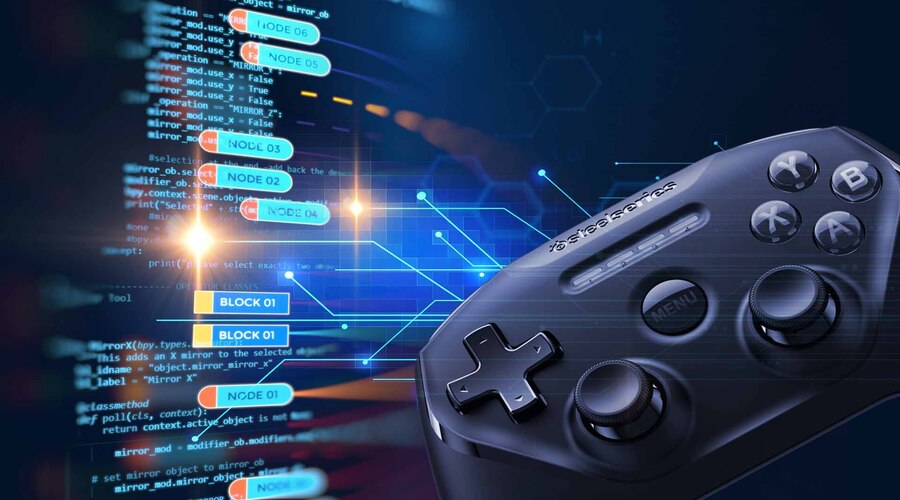Introduction
In recent years, blockchain technology has gained significant attention and revolutionized various industries. One of the sectors that has embraced blockchain’s potential is gaming. Blockchain gaming combines the features of blockchain technology with traditional gaming, offering a new and innovative gaming experience. In this article, we will explore the basics of blockchain gaming, how it works, its benefits, popular blockchain games, investing opportunities, and the challenges and future of this exciting field.
What is Blockchain Gaming?
Blockchain gaming refers to the integration of blockchain technology into video games, creating a decentralized and transparent gaming environment. Unlike traditional games where the game developer retains control over the game assets, blockchain games utilize smart contracts and non-fungible tokens (NFTs) to give players true ownership and control over their in-game assets. This ownership allows players to trade, sell, or even use their assets across different games and platforms.
How Does Blockchain Gaming Work?
Blockchain gaming operates on a decentralized network of computers, also known as a blockchain. Each game asset, such as characters, weapons, or virtual items, is represented as a unique token stored on the blockchain. These tokens are secured by cryptographic algorithms, ensuring their authenticity and preventing unauthorized duplication or tampering.
Smart contracts, self-executing agreements coded on the blockchain, govern the rules and interactions within the game. These contracts define the ownership, transfer, and functionality of in-game assets, enabling transparent and immutable transactions. The use of blockchain technology provides players with verifiable scarcity, provable fairness, and secure ownership of their digital assets.
Benefits of Blockchain Gaming

Blockchain gaming offers several benefits to players and developers alike:
- True Ownership: Players have real ownership of their in-game assets, allowing them to trade, sell, or transfer them as they wish.
- Interoperability: Blockchain games enable interoperability, meaning that assets acquired in one game can be used in another game within the same blockchain ecosystem.
- Transparency and Security: Blockchain’s decentralized nature ensures transparency and security, making it nearly impossible to hack or manipulate game assets.
- Play-to-Earn: Some blockchain games allow players to earn cryptocurrency or other rewards by playing, creating opportunities for players to monetize their gaming skills.
- Community and Governance: Blockchain games often have active communities involved in decision-making processes through decentralized governance systems, allowing players to have a say in the development of the game.
Popular Blockchain Games
Blockchain gaming has seen the emergence of several popular games that have captured the attention of players worldwide. Some notable examples include:
- CryptoKitties: A game where players collect, breed, and trade unique virtual cats using Ethereum’s blockchain.
- Axie Infinity: A game where players can collect, breed, and battle fantasy creatures known as Axies, earning cryptocurrency rewards in the process.
- Decentraland: A virtual reality platform powered by blockchain, allowing users to create, explore, and monetize their virtual experiences.
- Gods Unchained: A digital trading card game where players can own, trade, and compete with unique cards on the Ethereum blockchain.
Investing in Blockchain Gaming
As blockchain gaming continues to gain popularity, it has attracted the attention of investors looking for opportunities in this growing market. Investing in blockchain gaming can be done through various avenues:
- Acquiring In-Game Assets: Players and investors can acquire valuable in-game assets that have the potential to appreciate in value over time.
- Investing in Game Development Companies: Investing in game development companies that focus on blockchain gaming can be a way to participate in the industry’s growth.
- Cryptocurrency Investments: Investing in cryptocurrencies that are widely used within the blockchain gaming ecosystem can provide exposure to the industry’s success.
Challenges and Future of Blockchain Gaming
While blockchain gaming presents exciting possibilities, it also faces challenges that need to be addressed for wider adoption. Some of the challenges include scalability, user experience, and regulatory uncertainties. However, as technology advances and more innovative solutions are developed, the future of blockchain gaming appears promising. We can expect improved scalability, enhanced user experiences, and clearer regulatory frameworks to support the growth of this industry.
Exploring the Potential of Blockchain Gaming
Emerging Trends in Blockchain Gaming
The world of blockchain gaming is constantly evolving, driven by emerging trends that shape the industry. One prominent trend is the rise of play-to-earn models, where players can earn valuable rewards, cryptocurrencies, or in-game assets by participating in gameplay or completing specific tasks. This innovative approach not only enhances player engagement but also offers new avenues for economic empowerment within the gaming community.
Another exciting trend is the concept of metaverses in blockchain gaming. Metaverses are virtual worlds where players can explore, interact, and build their own experiences. These immersive environments enable social interactions, virtual economies, and limitless creative possibilities. As blockchain technology provides the foundation for secure ownership and trade of virtual assets, metaverses have the potential to redefine the way we perceive and engage with digital experiences.
Artificial intelligence (AI) is also making its mark in blockchain gaming. AI-powered NPCs (non-player characters) can enhance the gameplay experience by offering dynamic interactions, realistic behavior, and adaptive challenges. Integrating AI into blockchain gaming opens up exciting possibilities for more immersive and lifelike virtual environments, where players can engage with intelligent entities that respond and evolve based on their actions.
The Role of NFTs in Blockchain Gaming
Non-Fungible Tokens (NFTs) have revolutionized the concept of ownership within the blockchain gaming landscape. NFTs are unique digital assets that represent ownership or proof of authenticity of a specific item or piece of content. In the context of gaming, NFTs enable players to truly own their in-game assets, such as characters, weapons, or virtual properties.
The introduction of NFTs in blockchain gaming has profound implications. It introduces the concept of digital scarcity, where each NFT represents a limited edition or a one-of-a-kind item. This scarcity adds value to these assets, allowing players to trade or sell them in decentralized marketplaces, creating vibrant secondary markets for virtual goods.
NFTs also enable cross-game interoperability, where players can utilize their assets across different games or even different gaming platforms. For example, a sword acquired in one blockchain game could be used in a completely different game within the same blockchain ecosystem, unlocking new possibilities for customization and personalization.
Moreover, NFTs provide a new revenue stream for game developers. They can monetize their creations by issuing limited edition or exclusive NFTs that hold value for collectors or dedicated fans. This direct relationship between developers and players fosters a more sustainable and equitable gaming ecosystem.
Blockchain Gaming and Social Impact
Beyond entertainment, blockchain gaming has the potential to drive social impact initiatives. By leveraging the transparency and traceability of blockchain technology, gaming communities can come together to support charitable causes and promote sustainability.
Blockchain-based charity events and fundraisers can provide a transparent and accountable way for players to contribute to social causes. Donations can be tracked on the blockchain, ensuring that funds are allocated as intended and providing a higher level of trust for participants.
Furthermore, blockchain gaming can contribute to sustainability efforts. Blockchain networks can incentivize eco-friendly practices, such as energy-efficient gameplay or carbon-neutral gaming activities. Additionally, the integration of blockchain technology can enable the tracking of environmental impact and promote responsible resource management within virtual worlds.
Blockchain gaming communities can also foster social engagement and inclusivity. Decentralized governance models allow players to have a say in the development of the game, ensuring that decisions are made collectively and reflecting the desires of the community. This democratic approach empowers players and creates a sense of ownership and belonging.
Blockchain Gaming and Data Privacy
As blockchain gaming relies on distributed ledger technology, it offers enhanced data privacy and security compared to traditional gaming models. The decentralized nature of blockchain networks reduces the risk of data breaches and unauthorized access to personal information
Exploring Blockchain Gaming Platforms
- Ethereum-based Gaming Platforms: Delve into the Ethereum ecosystem and discover the prominent blockchain gaming platforms built on this network, exploring their features, games, and user experiences.
- Alternative Blockchain Gaming Platforms: Explore alternative blockchain platforms for gaming, such as Binance Smart Chain, Flow, or Polygon, highlighting their unique characteristics, games, and potential advantages.
- NFT Marketplaces for Gaming Assets: Investigate popular NFT marketplaces dedicated to gaming assets, including OpenSea, Rarible, or NBA Top Shot, and learn about the process of buying, selling, and trading digital collectibles.
- Blockchain Gaming and Cross-Chain Compatibility: Discuss the concept of cross-chain compatibility in blockchain gaming, examining protocols and solutions that enable the transfer and use of assets across different blockchain networks.
- Blockchain Gaming and Layer-2 Scaling Solutions: Discover how layer-2 scaling solutions, such as Optimistic Rollups or Sidechains, are addressing scalability issues in blockchain gaming and improving the overall user experience.
The Future of Blockchain Gaming
- Gaming on Decentralized Cloud Platforms: Explore the potential of decentralized cloud platforms, like Ethereum 2.0 or Filecoin, to provide scalable infrastructure for blockchain gaming, enabling seamless experiences and reducing costs.
- Blockchain Gaming and Artificial Intelligence: Discuss the fusion of blockchain gaming with artificial intelligence technologies, such as AI-powered NPCs (non-player characters), dynamic game environments, or adaptive gameplay.
- Blockchain Gaming and Virtual Reality (VR): Investigate the convergence of blockchain gaming and virtual reality, examining the potential for immersive VR gaming experiences within blockchain-powered worlds.
- Sustainability in Blockchain Gaming: Delve into the concept of sustainability in blockchain gaming, including the environmental impact of blockchain technology, carbon-neutral initiatives, and eco-friendly blockchain gaming practices.
- The Democratization of Game Development: Analyze how blockchain technology is empowering independent game developers by enabling crowdfunding, decentralized game publishing, and fair revenue distribution models.
Conclusion
Blockchain gaming merges the power of blockchain technology with the entertainment value of gaming, offering players true ownership of their in-game assets, transparency, and exciting new opportunities. With popular games already captivating audiences and investors recognizing the potential, blockchain gaming is poised to shape the future of the gaming industry. As the technology continues to evolve, we can expect more engaging experiences, increased adoption, and further integration of blockchain in the gaming world.

